
Early Thursday morning, after 20 hours of talks, the White House announced that a looming rail strike was averted and a tentative deal struck between the freight rail operators and their unions. The run-up to the agreement had businesses — and the economy — on the brink.
Why it matters: The negotiations, which started in 2019 but reached a fever pitch this week, were the latest issue to pop up in the game of supply chain whack-a-mole we've played for two-plus years.
Virtually every part of the economy needs functioning railways. Plus, a strike would have driven up prices at a time when inflation is showing signs of remaining stubbornly high.
What's happening: "The tentative agreement now goes back to the unions for a vote," according to a source familiar with the talks. The parties also agreed to a post-ratification cooling-off period of several weeks, to ensure that if a vote doesn't succeed the rails keep running.
Catch-up quick: Businesses were seeing some delays leading up to the agreement, John Drake, VP of transportation, infrastructure and supply chain policy at the Chamber of Commerce, said in a statement to Axios.
The beer, food, retail, wholesale, manufacturing and energy sectors all either put out statements warning of devastating consequences or urged Congress to step in.











